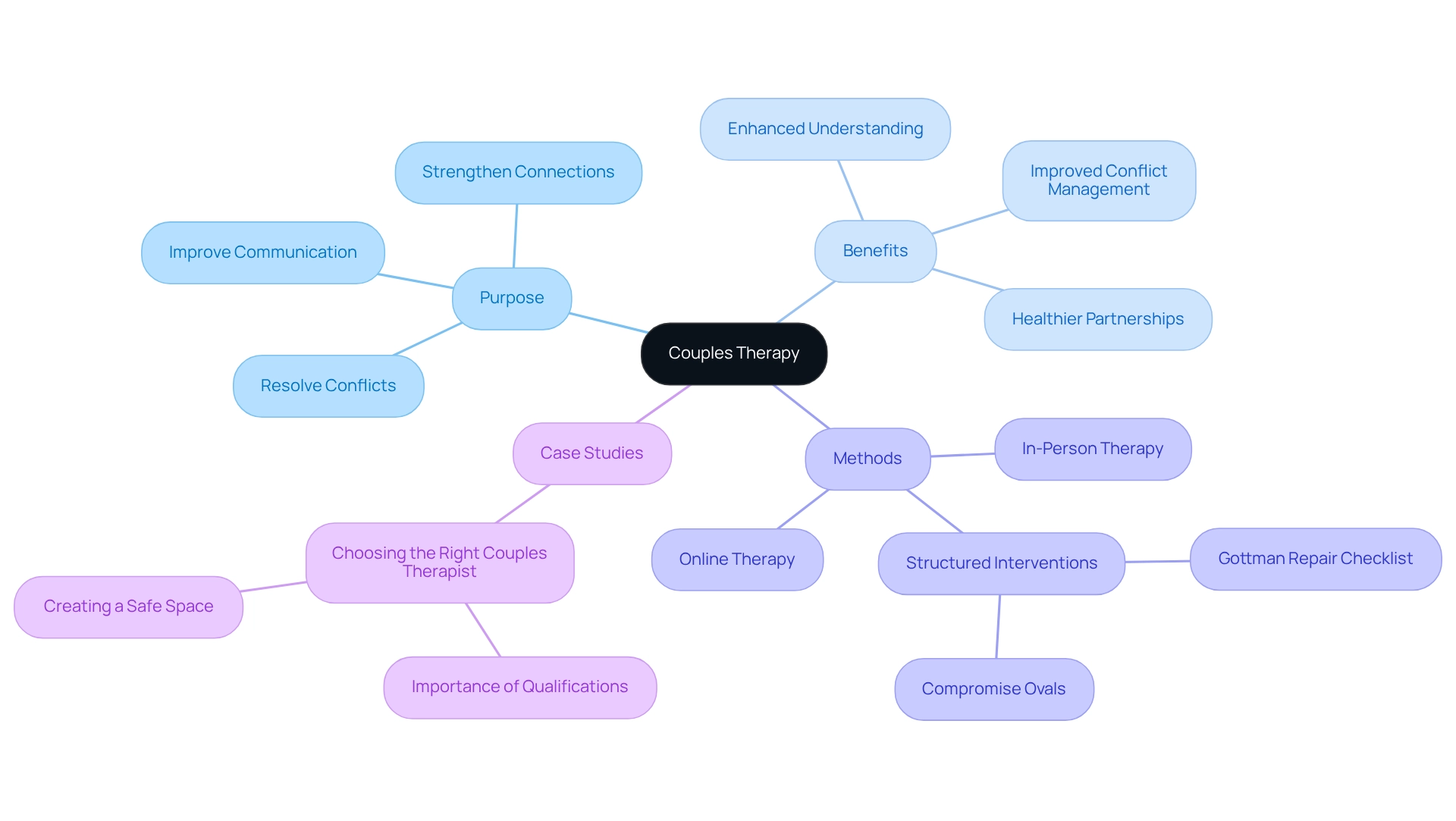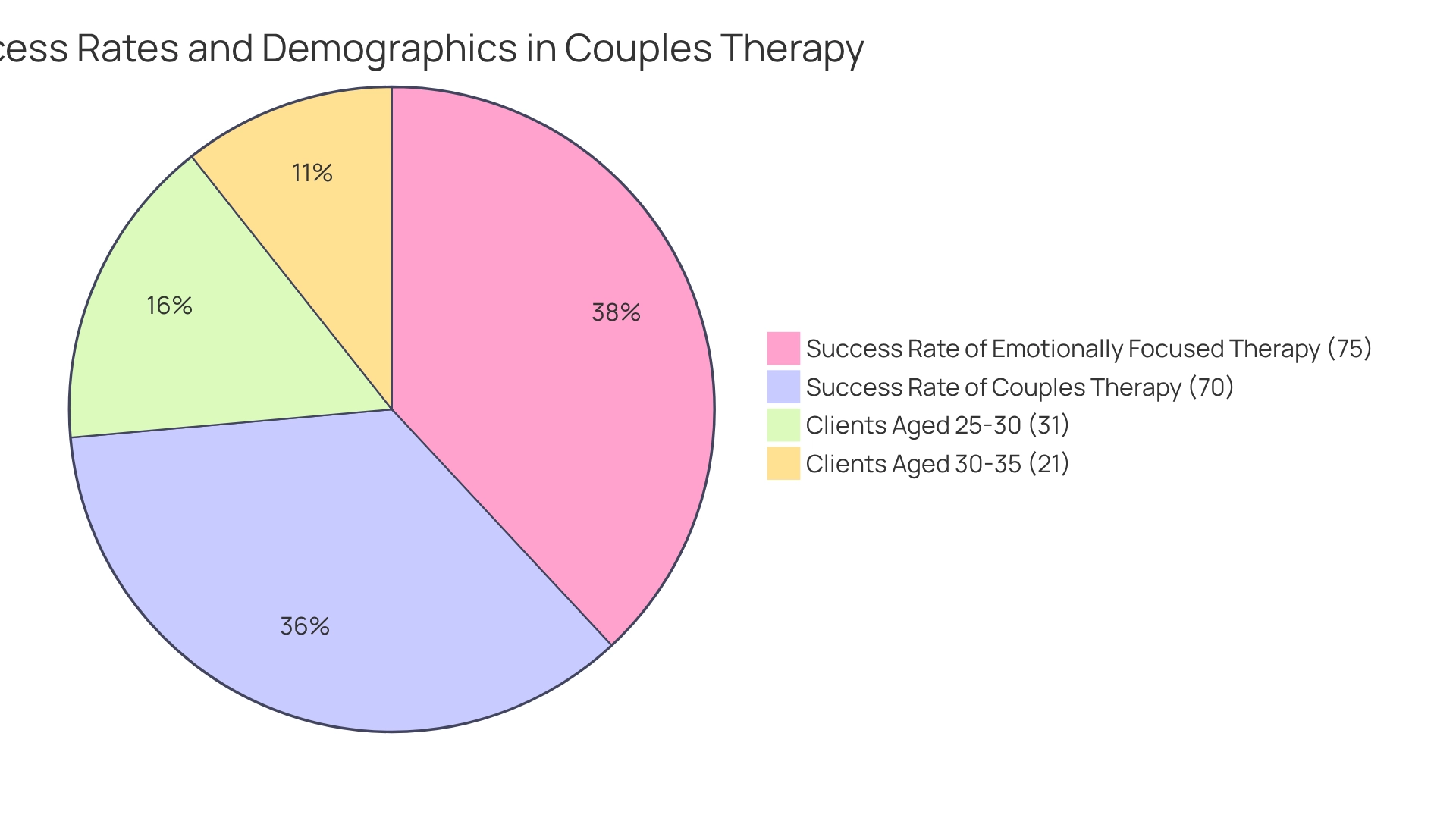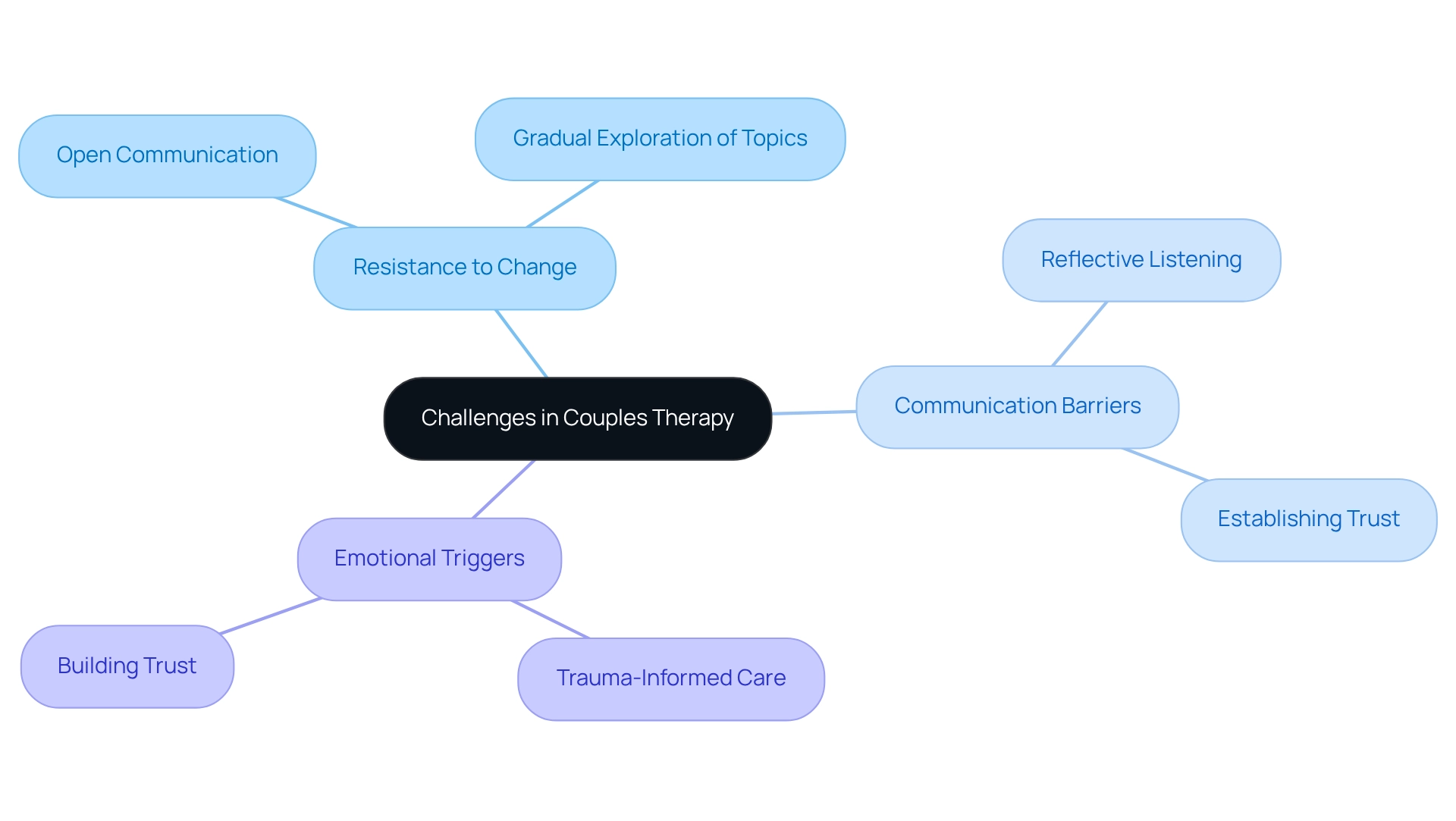Overview
Couples therapy offers a compassionate path towards improving relationship satisfaction and resolving conflicts. Have you ever felt overwhelmed by your relationship challenges? Studies indicate that approximately 70% of participants experience significant enhancements in their relationships through therapy. This effectiveness is nurtured by various therapeutic methods, such as:
- Emotionally Focused Therapy
- the Gottman Method
These approaches provide structured interventions that empower partners to communicate better and strengthen their emotional connections. As we explore this further, consider how these methods could support your journey towards healing and connection.
Introduction
In the intricate landscape of modern relationships, have you ever felt overwhelmed by emotional turbulence or communication breakdowns? Couples therapy emerges as a beacon of hope, offering a structured environment where partners can gently explore their challenges and foster deeper connections. This therapeutic journey not only seeks to resolve conflicts but also enhances understanding and emotional intimacy, equipping couples with the essential tools for lasting change.
With a variety of effective techniques available, therapists guide couples through the complexities of their interactions, enabling them to rebuild trust and strengthen their bond. As research highlights the transformative potential of therapy, exploring its methods and addressing common challenges becomes vital for those yearning to improve their relational dynamics.
Remember, seeking help is a courageous step towards healing and connection.
Define Couples Therapy and Its Purpose
This form of counseling, often referred to as couples support, is a specific type of psychotherapy designed for individuals in committed relationships. Its primary goal is to help partners resolve conflicts, improve communication, and strengthen their emotional connections. In this nurturing therapeutic setting, partners can safely explore their feelings, gain insights into each other's perspectives, and work together to address their challenges. By focusing on the dynamics of relationships rather than personal issues, relationship counseling fosters healthier partnerships characterized by mutual understanding and respect.
Have you ever felt overwhelmed by misunderstandings in your relationship? Research indicates that an important question is whether couples therapy works in significantly enhancing communication and awareness of each partner's needs, with online sessions yielding results comparable to traditional face-to-face meetings. Experts highlight the effectiveness of structured interventions, such as the Gottman Repair Checklist, which equips partners with tools to express their needs assertively and listen actively. Real-world examples reveal the transformative power of relationship counseling. Partners who engage in counseling often report improved conflict management skills and a deeper emotional bond.
As we explore this further, a case study on selecting underscores the importance of finding a qualified expert who can create a safe space for open dialogue—essential for achieving successful treatment outcomes. Ultimately, individuals seeking to navigate their challenges and foster lasting improvements often wonder, does couples therapy work as a valuable resource? If you are feeling uncertain or struggling, consider reaching out for support; your journey toward healing and connection can begin today.

Examine the Effectiveness of Couples Therapy: Evidence and Statistics
Studies consistently show that the question of whether couples therapy works can be answered affirmatively, as it greatly improves satisfaction and addresses conflicts. Have you ever felt overwhelmed by relationship challenges? typically take place weekly or biweekly, reflecting the dedication necessary for successful results. A research article released in the Journal of Marital and Family Counseling suggests that around 70% of partners notice significant enhancements in their relationships after they determine if couples therapy does work. In addition to this, a recent meta-analysis highlights that partners engaging in Emotionally Focused Therapy (EFT) achieve a remarkable success rate of around 75%. These discoveries demonstrate the transformative potential of relationship counseling, allowing partners to restore trust, enhance communication, and deepen emotional closeness.
Significantly, individuals aged 25-30 years constituted the largest segment of those receiving assistance (31%), followed by those aged 30-35 years (21%). This illustrates the demographics of clients seeking support. Furthermore, surveys indicate that almost 90% of clients feel they obtained the essential assistance from treatment, which suggests that does couples therapy work as an important resource for partners encountering difficulties. The flexibility of therapeutic methods, especially for varied groups like LGBTQ partnerships and stepfamilies, further boosts the effectiveness of treatment, fostering improved relational results.
Moreover, the incorporation of divorce counseling as a crucial ability for couple counselors emphasizes the wider context of couples support and its significance for individuals contemplating separation. At The Emerald Couch, we understand that your time is precious and that financial constraints can be a concern. We offer virtual appointments for those who may need them, ensuring that you can access the support you need in a way that fits your life. We are committed to providing a non-judgmental space where you can explore these challenges and find the support you need.

Explore Techniques Used in Couples Therapy: Methods for Success
The question of whether couples therapy works is often addressed through various methods designed to improve communication and resolve conflicts, each tailored to the unique dynamics of the partnership. Have you ever felt that your relationship could benefit from a deeper understanding? Here are some key methods that might resonate with you:
- Emotionally Focused Therapy (EFT): This approach centers on identifying and transforming negative interaction patterns, fostering a deeper emotional connection between individuals. Studies show that EFT greatly enhances satisfaction in connections, with around 98% of individuals reporting favorable experiences in therapy. Mindfulness techniques, like meditation and conscious breathing, can improve this process by assisting individuals in becoming more aware of their emotional reactions and the dynamics involved during interactions.
- (CBT): CBT helps pairs in identifying and altering negative thought patterns that lead to difficulties in their connections. By promoting healthier communication, this method helps partners develop more constructive interactions. Mindfulness encourages partners to observe their thoughts and feelings without judgment, facilitating a more constructive dialogue.
- The Gottman Method: Developed by Dr. John Gottman, this method emphasizes the importance of friendship, conflict management, and creating shared meaning within relationships. It is based on extensive research and has demonstrated high satisfaction rates among partners who engage in this therapeutic approach. Incorporating mindfulness can help partners slow down during conflicts, allowing them to respond thoughtfully rather than react impulsively.
- Imago Relationship Therapy: This technique encourages partners to explore their childhood experiences and understand how these influence their current behaviors. By nurturing empathy and connection, Imago treatment assists partners in managing their challenges more effectively. Mindfulness can aid in this exploration by helping individuals become more aware of their emotional triggers and responses, leading to the question of whether couples therapy works in providing essential tools for couples to address their issues and contribute to long-term emotional well-being. Significantly, 76% of clients in face-to-face sessions report notable improvement, which suggests that couples therapy works effectively in enhancing relationships. As you consider the possibilities for healing, remember that seeking support is a courageous step towards a more fulfilling connection.
Identify Challenges in Couples Therapy and Strategies to Overcome Them
Couples therapy can present various challenges that may hinder progress, including:
- Resistance to Change: Partners often hesitate to confront difficult issues or alter established patterns. To address this, therapists at The Emerald Couch promote open communication and encourage gradual exploration of sensitive topics, creating a safe space for discussion. It’s important to recognize that counseling is not a single session to resolve all issues; it may require time to attain desired results.
- Communication Barriers: Misunderstandings frequently arise during therapy sessions, complicating the healing process. Techniques such as reflective listening can be employed to help partners articulate their feelings, ensuring that both individuals feel heard and understood. At The Emerald Couch, we prioritize establishing a trusting therapeutic connection, which is essential for effective communication.
- Emotional Triggers: Discussions may evoke past traumas, leading to heightened emotions that can disrupt the therapeutic process. Therapists trained in trauma-informed care at The Emerald Couch are equipped to assist partners in navigating these triggers safely, fostering a supportive environment conducive to healing. We recognize that learning to trust another person while dealing with pain is essential, and we concentrate on building a bond of trust before engaging in any triggering situations.
To ensure the right therapist fit, we conduct an assessment process that helps match clients with the most suitable provider. Statistics indicate that 71% of partners who have engaged in counseling would suggest it to others, highlighting that many believe that couples therapy works, despite these difficulties. Research on Emotionally Focused Therapy (EFT), which is based on attachment theory, raises the question of whether couples therapy works, as partners engaging in this approach are more likely to experience lasting improvements in their relationships. Furthermore, therapists often combine EFT's emotional work with Cognitive Behavioral Therapy's (CBT) practical tools to provide comprehensive support. As Wright-Hewitt mentions, "It’s never too late to choose to attend relationship counseling." Merely because a pair delays seeking counseling doesn’t mean it isn’t recoverable. By recognizing these challenges and employing effective strategies, couples can enhance and work towards a healthier, more fulfilling relationship.

Conclusion
Navigating the complexities of modern relationships can indeed be challenging. Have you ever felt overwhelmed by your past? Couples therapy offers a structured path toward healing and connection. Through various methods such as:
- Emotionally Focused Therapy
- Cognitive Behavioral Therapy
- The Gottman Method
couples can learn to enhance communication, resolve conflicts, and deepen emotional intimacy. Research consistently shows that a significant percentage of couples experience improved satisfaction and relational dynamics after engaging in therapy, underscoring its transformative potential.
Despite the challenges that may arise during the therapeutic process—such as resistance to change and communication barriers—therapists are equipped with strategies to guide couples through these hurdles. Creating a safe space for open dialogue and fostering trust are vital components in overcoming these obstacles. The importance of finding the right therapist cannot be overstated, as the therapeutic alliance plays a crucial role in achieving desired outcomes.
Ultimately, seeking couples therapy is a courageous and proactive step towards building a healthier partnership. By embracing this journey, couples not only address their immediate challenges but also equip themselves with lifelong tools for understanding and connection. Investing in the relationship paves the way for a more fulfilling future, reminding partners that it is never too late to seek support and strive for lasting improvement.
Frequently Asked Questions
What is couples support counseling?
Couples support counseling, also known as relationship counseling, is a specific type of psychotherapy designed for individuals in committed relationships. Its primary goal is to help partners resolve conflicts, improve communication, and strengthen their emotional connections.
How does relationship counseling benefit couples?
Relationship counseling fosters healthier partnerships by allowing partners to explore their feelings, gain insights into each other's perspectives, and address their challenges in a safe environment. This process enhances mutual understanding and respect.
Does couples therapy improve communication between partners?
Yes, research indicates that couples therapy significantly enhances communication and awareness of each partner's needs. Online sessions have been found to yield results comparable to traditional face-to-face meetings.
What structured interventions are effective in couples therapy?
Structured interventions, such as the Gottman Repair Checklist, are effective in couples therapy. They provide partners with tools to express their needs assertively and listen actively.
What outcomes can partners expect from engaging in relationship counseling?
Partners who engage in relationship counseling often report improved conflict management skills and a deeper emotional bond.
How important is it to find a qualified relationship counselor?
Finding a qualified relationship counselor is crucial as they can create a safe space for open dialogue, which is essential for achieving successful treatment outcomes.
Does couples therapy work as a valuable resource for improving relationships?
Yes, many individuals seeking to navigate their challenges and foster lasting improvements find couples therapy to be a valuable resource for relationship transformation.




